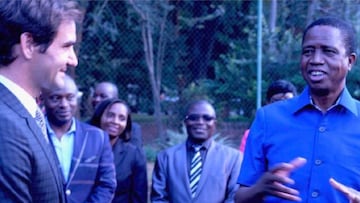Roger Federer visits Zambia to check on his foundation
Seven years ago, the Roger Federer Foundation launched a project aiming to support and strengthen education in Zambia.

The 20-time Grand Slam winner Roger Federer arrived in Zambia to check on how is his foundation doing.
The Roger Federer Foundation (RFF) began its work in Zambia in August 2011, aiming to provide equitable access to quality basic education to children.
‘Very happy to be in Zambia, working with the Roger Federer Foundation,’ Federer wrote on a Twitter post.
Very happy to be in Zambia 🇿🇲 working with the @rogerfedererfdn. It’s my first time here! pic.twitter.com/SUKMnHwtQ7
— Roger Federer (@rogerfederer) April 23, 2018
Federer meets with Zambian president
On Monday, the tennis star met with Zambian president Edgar Lungu.
The two held talks before Federer presented the politician with an autographed racket.
‘I met World Tennis Champion Roger Federer who paid a Courtesy call on me at State House. He is in the country to check on his foundation, the Roger Federer Foundation (RFF), which aims at providing equitable access to quality basic education to children,’ Lungu wrote on his Facebook official account.
‘It’s important to note that his foundation began its work in Zambia in partnership with People’s Action Forum (PAF) in August 2011 and launched a community school initiative in rural areas of #Zambiatogether with It’s local partner organization.’
Thank you for hosting us. We look forward to further collaboration in accelerating acces to early childhood education for all children in Zambia #President RepublicofZambia #SDG4 pic.twitter.com/QGunVwYOUu
— Roger Federer Fdn (@rogerfedererfdn) April 22, 2018
Education: A complicated issue in Zambia
According to the UNESCO’s Education For All (EFA) Zambia’s profile, children from the Southern African country face tremendous lack of classrooms, resulting in double or even triple shift systems and high pupil-teacher ratios (58 pupils per teacher).
However, the most concerning issue is the resulting low level of learning achievements, as the country attained the lowest scores in both reading and math of all countries participating in the 2007 Evaluation of Southern and Eastern African Consorting for Monitoring Educational Quality (SACMEQ).
Related stories
To counter this situation, the Board of the RFF has approved a total budget of 1.6 million Swiss Franc.
According to information by the Lusaka Times, the program has reached over 85,000 children so far.
